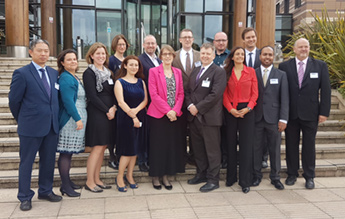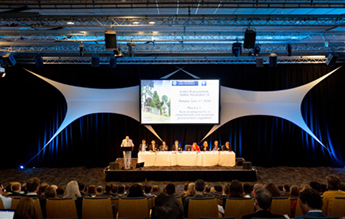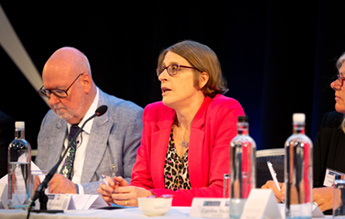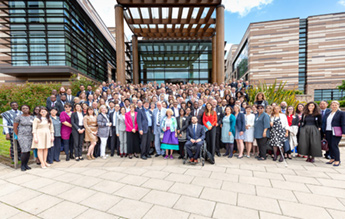For 20 years the Public Procurement Research Group of the School of Law has hosted the major international conference in this field and the 9th in the series, Public Procurement: Global Revolution IX, took place at the East Midlands Conference Centre on 17 and 18 June 2019. The event brought together, as always, the world's leading academics for a dialogue with national regulators and procurement practitioners, and representatives from national and international institutions such as the Cabinet Office and UK Government Departments, the European Commission, OECD, the WTO, UNCITRAL, the World Bank and other multilateral development banks. With almost 40 workshops over the two days, the event featured 130 speakers and more than 300 participants from all parts of the globe from Australia to Zimbabwe.
In addition to the inevitable concerns of the moment such as Brexit, the event covered a range of contemporary and emerging developments at national, EU and international levels. Highlights included some fascinating papers on the potentially radical impact for public procurement of new technologies, covering open data and open contracting, use of data for performance measurement, the potential of commercial online marketplaces and the role of blockchain technology as a tool for audit and anti-corruption. It will be interesting, in particular, to see the literature on blockchain and open data develop as there is currently so little written but such a lot going on in practice. In a special workshop on corruption in sport procurement Professor Sue Arrowsmith QC, Director of the PPRG, presented the results of a mapping exercise of procurement for the Olympics and other international sport events conducted with the OECD for the International Partnership against Corruption Sport (IPACS) that forms the basis of forthcoming IPACS recommendations for safeguarding against corruption in these events. One of the key conclusions of this work was the need for event-wide information to be recorded in an accessible and standardised form, and this theme was picked up in a paper by Gavin Hayman, CEO of the Open Contracting Partnership, who presented on the potential role of the Open Data Standard at the 2024 Paris Olympics.
The plenary session on the first day reviewed the key new developments in international and domestic procurement regulation. The opening remarks were made by Rob Anderson, recently retired from the WTO and now honorary professor and active lecturer with the PPRG, whose own outstanding contribution to the World Trade Organisation’s success with the Government Procurement Agreement was also highlighted by Antony Taubman of the WTO. Professor Dr Carl Baudenbacher, former President of the EFTA Court gave the keynote address giving us a view of Brexit from the judiciary and spoke eloquently about the importance of the dispute settlement arrangements between the EU and UK after Brexit and the dangers of what he referred to as the ‘colonial-type’ model in the current draft Withdrawal Agreement between the EU and UK. Peter Bennett from the Cabinet Office followed with an update on UK issues, including the prospects for procurement post-Brexit. This was followed by updates from Caroline Nicholas from the UNCITRAL Secretariat and Antony Taubman from the World Trade Organisation, who also referred to the important contribution made by the PPRG itself to the recent success of the WTO's recent work on government procurement, and Paulo Magina, director at the public procurement unit in the OECD’s Public Sector Integrity Division. Malcolm Harrison, the recently appointed Chief Executive Officer of the Chartered Institute of Procurement and Supply (CIPS) gave us an update on CIPS work on professional development in procurement. Duncan Osler rounded off the session with and update from the Procurement Lawyers Association (PLA).
During our plenary on the second day, we were delighted to welcome the eminent Professor William Kovacic, George Washington Law School, former head of the US Federal Trade Commission and currently a director of the UK’s Competition and Markets Authority, on his recent research into big-rigging and public procurement and from Vassilios Kanaras from the European Commission on the new initiatives being considered by the European regulator on the same theme. These issues were then explored in depth in some specialist workshops.
Our custom of awarding bursaries to deserving participants from developing countries was formalised this time around and three bursaries funded jointly by the PPRG and the PLA were awarded to participants from Jamaica, Uzbekistan and South Africa.
The PPRG was also proud to use the conference as a platform for the launch of a new book on Public Procurement and Aid Effectiveness co-edited by Annamaria La Chimia and Peter Trepte. The presence of a number of the contributors at the conference facilitated a lively workshop to debate the framework for discussion proposed by the book.
#PPGRConf is now the most prestigious global event in the public procurement event calendar and we look forward to seeing our friends, old and new, again in 2021. Watch the website for further updates and photographs.


- Left: The Public Procurement Research Group, School of Law
- Right: Plenary session, Day 1 of the conference, with keynote speaker Carl Baudenbacher and presentations from the World Trade Organization, OCED, United Nations, Cabinet Office, Chartered Institute of Procurement and Supply and Procurement Lawyers Association


- Left: Professor Sue Arrowsmith opens the conference, with keynote speaker Carl Baudenbacher
- Right: Speakers and delegates at Public Procurement: Global Revolution IX
Posted on Tuesday 2nd July 2019